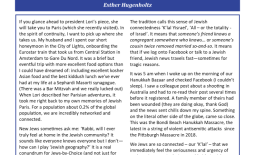The Mission Statement of the Jewish People
Here’s an unexpected question: what is the commonality between synagogue governance and Matan Torah, Revelation at Sinai?
I could imagine you might be thinking right now: is the rabbi really going to give a sermon on synagogue governance? The answer is yes. Well, at least partially. So better get comfortable because this will be a very exciting sermon!
Synagogue governance is one of those things that may be part of an adult, responsible but slightly pedestrian life, like brushing your teeth twice a day, doing your ironing, going to the DMV or casting your vote. We don’t tend to think of our Board structures and Committee meetings in existential terms, or to thing about the nuts and bolts of our communal life as pathways to deep, transformative meaning. In a small community like ours, there is often the realistic admission that governance is a matter of a job that needs doing and we deeply value the people who do it and give so much of themselves doing it. A synagogue community is, in many ways, like a village, with many disparate components that require care and attention. I truly believe that synagogues are cherished incubators of direct democracy pushing back against a larger globalized culture where our choices can feel anonymous and futile.
In short, if you want to make a difference, join a synagogue Board.
Some of you today here may have been Board members in the past, present or future. Some of you may have had no encounter (yet!) with synagogue governance. Those of you who serve on the Board currently, you may know that we are working on a number of strategic goals, including a Mission and Vision Statement that is very close to finalization. Once it’s finalized, we will not only circulate and announce it in the community, but I as your rabbi, will invite you to do some learning on its core values and tenets too.
Lest you think this is the most Boring Sermon Ever, allow me to switch gears. The audacious claim of Judaism is that the mundane matters. For us, no body-mind dichotomy. For us, not the Gnosticism of a pure ethereal spirit world contrasted with the defilements of material reality. For the Jew, there is no separation between Heaven and Earth. Like the interlocking triangles of the Star of David, we Jews celebrated the integration of the holy with the everyday. It is in this light that it is not just virtuous but perhaps even a mitzvah to talk about the nuts and bolts of running our community, because while a lot of this holy work happens in the background, I don’t think it has to be silent. We are blessed to have an incredible team of dedicated lay leaders, volunteers and professional staff all working towards the vision of all that Agudas Achim can be. Sometimes that work is lofty; articulating deeply held convictions, advocating for our values and the vulnerable in the public sphere. And sometimes, that work is more prosaic and it involves schlepping, cooking, cleaning, administrating, emailing, setting up and God knows what else. Each and every task is valuable and valued.
Of course, we rabbis are quick to point out to sacred analogies in our tradition for the granular activities of serving congregational life. In a few weeks, we will learn about the equally granular work of building the Tabernacle in what I lovingly call ‘the Ikea Parshiyot’. This is often where rabbis and synagogue presidents pitch fundraising and collective involvement in the life of the synagogue. I would, however, like to take a step back and focus on Parashat Yitro, this week’s Parashah. What is particularly compelling about Parashat Yitro is that if we see a blueprint for the nuts and bolts of a community a few weeks down the line, then this week, we see the blueprint for a mission, vision and values statement.
Parashat Yitro, friends, is the Mission Statement of the Jewish People.
Like any good Mission Statement, it both grounds the community in who we are as well as push us to consider who we want to be. Like any good Mission Statement, it also identifies who is seated at the table and who is yet to be included. Like a good Mission Statement, int appeals to our higher values while inviting us to strategize how we actualize those values in the world. In short, the Parashah is a surprisingly relevant text from a synagogue governance perspective and also adds its own unique flair.
The hero of the portion is Yitro, the ‘choten’, the father-in-law of Moses. He is the consummate outsider who becomes ultimate insider and we see the Israelites and their God through his eyes. ‘Vayishma Yitro’, the portion opens. ‘Yitro heard’. What did he hear? According to some commentators, he heard about the Israelites battling with their mortal enemy, the Amalekites. According to others, he heard about the impending Revelation at Mount Sinai. How true to our own experience this may be, where we frame our relationship to Judaism – both in the potentially negative or positive – to what we ‘hear’ or ‘perceive’ Judaism to be in our lives. This is why it is important to focus on Jewish joy as an avenue to enduring meaning.
Furthermore, Yitro becomes a spiritual seeker, and according to the Rabbis, even a Jew. ‘Baruch Adonai’, he says, ‘blessed is the Eternal’, and he draws close through offering sacrifices. Yitro’s abiding attachment to and love of the Jewish people would become important and relevant when he offers Moses management advice. But truth to be told, the Jewish People’s Mission Statement finds a way to welcome him – and others like him – in, no matter where they came from.
Deeper in the Parashah, we find God’s declaration of love for us. ‘For I bore you on eagles’ wings’; it is a tender image of what God and holy community can be: sheltering, protective but also uplifting, offering a broader perspective. A synagogue has the task to uplift us all, to let us soar on eagles’ wings, to find inspiration, safety and vision. And not only that; God takes us as God’s people and God becomes our God – the ultimate covenantal engagement. Reciprocity is at the basis of this relationship. How can we be reciprocal in our relationships with each other in this space? Of course, our Jewish People’s Mission statement continues on with the rousing ‘mamlechet Kohanim, goy kadosh’ – we are a ‘kingdom of priests and a holy nation’, for ‘all the Earth belongs to the Divine.’ This perfect balancing of the particularist and the universalist reflects the priorities and orientation of our Mission Statement: a particular people with a universal mission. We are here to nurture our internal relationships, to strengthen and grow our people, to enhance and enrich the quality of Jewish life and to safeguard the flourishing of our people. And we are here to be part of our world, to share the light of our Torah, to minister to others and walk the path to righteous engagement with the families of the Earth; through just action, compassionate relationships and the sharing of Jewish wisdom. To understand this is to know that these are not mutually exclusive goals but interlocking and interdependent ones: the Judaism of the past is just as clear on this as the Judaism of the future. We need to cast vision for all that we can be for ourselves and others.
And I didn’t even get to the good part yet: the actual giving of the Torah on Mount Sinai.
Over the course of the next few months, you will hear more about our Mission Statement and the other structural and strategic goals of the synagogue. I encourage each of us to take to heart what inspires us about being Jewish, what moves us to engage with the life of our community, what brings us joy and comfort and fuels us to shine our light.
Imagine engaging in the following exercise: what would you write as the Mission Statement for your own Jewish life? What values would manifest themselves? How would you engage your own heart? What does being Jewish and being in holy community mean to you as you stand at the foot of your own personal Mount Sinai?
Like Mount Sinai itself and its enduring Torah, all transformative ideas begin with the planting of a seed or a whisper at a Burning Bush.




